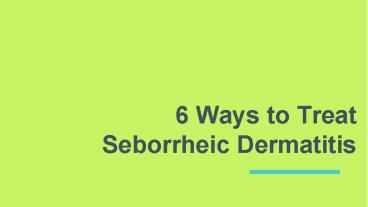6 Ways to Treat Seborrheic Dermatitis - PowerPoint PPT Presentation
Title:
6 Ways to Treat Seborrheic Dermatitis
Description:
Want to become a part of Seborrheic dermatitis clinical trials? Vial trial is the right destination. To know How to Treat Seborrheic Dermatitis, read this blog here! – PowerPoint PPT presentation
Number of Views:38
Title: 6 Ways to Treat Seborrheic Dermatitis
1
6 Ways to Treat Seborrheic Dermatitis
2
Have you noticed any red, itchy, and scaly rashes
on your scalp? If yes, then there are high
chances that you may have seborrheic
dermatitis. If ignored or not treated promptly,
the patches from seborrheic dermatitis may grow
more prominent, causing uncontrollable itching.
As you pick or scratch at the affected areas, the
infection spreads to the internal layers of your
scalp skin, resulting in severe hair loss
eventually. Seborrheic dermatitis is a chronic
inflammatory dermatologic condition that usually
appears on areas of the body with a large density
of sebaceous glands, such as the scalp, face,
chest, back, axilla, and groin. Professionals
conduct Seborrheic dermatitis clinical trials to
find the best treatment to control it.
3
Tea Tree Oil
- Mix eight to twelve drops of tea tree oil in a
carrier oil such as coconut oil or olive oil.
Apply this mixture to the affected area. This may
relieve you from itching while healing the scaly
patches on your scalp or skin.
4
Ayurvedic Therapies
- You can regularly undergo Ayurvedic panchakarma
therapies such as Abhyangam, Virechan, Murdha
thailam, Nasyam, and dosha-specific herbal
formulations to heal seborrheic dermatitis. Hot
oil treatment with Marichyadi thailam is also one
of the most effective Ayurvedic therapy to treat
seborrheic dermatitis, which needs to be
administered after examining your body's doshic
predominance.
5
Aloe Vera
- Apply freshly extracted aloe vera gel to the
affected area and leave it on. Aloe vera is well
known for its natural anti-inflammatory
properties and works well in treating seborrheic
dermatitis.
6
Other Medications
- Conventional allopathic treatments for seborrheic
dermatitis are usually effective if it is a mild
case. Antifungal creams and medicated shampoos
that contain chemicals such as selenium sulfide,
zinc pyrithione, coal tar, ketoconazole, etc.,
are often prescribed by doctors to treat
seborrheic dermatitis. In chronic seborrheic
dermatitis, doctors may prescribe corticosteroids
for oral ingestion, which significantly helps
calm skin inflammation.
7
Ayurvedic Diet
- Include foods that control the vitiation of Vata
and Kapha doshas in your diet to reduce
seborrheic dermatitis. Foods that taste bitter
such as bitter gourd work best to control
seborrheic dermatitis. You should Intake foods
rich in vitamin C, such as citrus fruits, bell
peppers, and plenty of leafy greens and almonds
regularly. You also need to avoid foods that are
excessively salty or sour, dairy, and cold items.
8
Self-care Tips May Help You Control Seborrheic
Dermatitis
- Soften and remove scales from your hair.
- Wash your skin regularly.
- Apply a medicated cream.
- Avoid styling products.
- Avoid skin and hair products that contain
alcohol. - Wear smooth-textured cotton clothing.
9
Thanks!
- Any questions?
- You can find me at
- www.vialtrials.com































